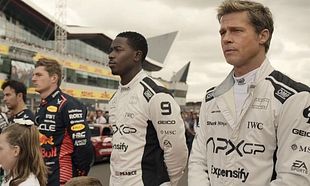Now living among the Na'vi in his avatar body, Jake Sully (Sam Worthington) and his wife Neytiri (Zoe Saldana) have raised three children together (Jamie Flatters, Britain Dalton, Trinity Jo-Li Bliss) and adopted a human child (Jake Champion) as well. Their peace is shattered when humans return with the intent not to mine Pandora but to colonise. Miles Quaritch (Stephen Lang), whose human body was killed, is regenerated into a Na'vi avatar, and is sent out with a team of mercenaries to hunt and kill Jake and the Na'vi insurgency...
Those who know their Hollywood history will recall that 'Titanic' was seen as a failure waiting to happen. The lengthy shoot, the budget overruns, all of it added up to disaster. Instead, it became a triumph for Cameron both critically and commercially, sailed through the Oscars in style, and set a course for its two stars that they've been on ever since. Cameron, meanwhile, effectively retired from the director's seat until 2009's 'Avatar', which went on to become another box office colossus. It's been eleven years since then. The king of the world may have returned, but the world he once ruled has moved on.
'Avatar: The Way of Water' has a beautifully designed, richly produced, deeply constructed world. Pandora looks alive and the seas are deep and inviting. The colours are magnificent, the seas and the oceans teeming with life of every kind. When you see the Na'vi creep out from jungle bushes, you can see every pore on their blue skin. Their eyes almost seem to glisten with life. Almost. Cameron is hammering the same plot devices, the same riffs that have served him well in the past. The last 30 minutes of the three-hour epic are set inside a sinking cruiser with the Sully family racing to get out before they're all dead. Romance blossoms between young lovers. Stephen Lang's a bad guy. All the familiar markers are there, yet it's just that - they're familiar. The only thing that's advanced here is the technology that showcases it all.
The 3D utilised in 'Avatar: The Way of Water' is much as you remember a decade ago. Depth is there, but you have to wear clunky glasses in order to see it. If you move your head ever so slightly it all comes out of focus - and we saw this on the largest IMAX screen in this country. As well as this, 'Avatar: The Way of Water' has a variable high-frame rate. This means that for certain scenes and sequences, the action looks like it's moving much faster and clearer. You'd normally find this on sports matches, or in video games. Here on a cinema screen, however, it looks - dare we say it for such a movie of this scale - kind of cheap. Moreover, it's used in fits and spurts throughout the movie, meaning your eyes have to adjust and readjust every time you see it. That's on top of trying to get used to the idea of 3D after so many years away from it.
On top of all this tiring out your eyes, 'Avatar: The Way of Water' suffers from a sluggish sense of pacing. The action sequences and setpieces are well-executed, but they're couched in between long-running scenes of the aquatic life of Pandora and the childlike wonder it inspires. The woo-woo philosophy of Pandora is more woo-wooier when you have the Na'vi talking to whale-like creatures and referring to them as spirit siblings and the like. Cameron makes it abundantly clear throughout that he isn't interested in drawing - pardon the pun - three-dimensional characters here. Humanity has returned to Pandora - why? Because Earth is dying. Why is Quaritch out for revenge? Because he was killed by Neytiri in the last one. On top of this, much of the focus is on the child cast and angled away from the parents, who ultimately end up saving the day.
'Avatar: The Way of Water' doesn't seem to know what it wants to be at any given point in its three-hour runtime. There are times when it wants to be a technical exercise, showcasing all the beauty and wonder of 3D and cinema again. That it spends so long doing this draws it out well past the point of being effective. For a movie that's this damn long, there's plenty in it that could have been sacrificed for expediency. Do we really need to see another oceanographic kaleidoscope? Alternatively, there are times when it wants to be this action-packed sci-fi epic, yet it is so generic and linear that it barely registers. For a director who penned and directed arguably one of the greatest sci-fi sequels ever made, the screenplay - of which he is one of four writers, by the way - is a serious letdown.
Ultimately, what will spell the success of 'Avatar: The Way of Water' is whether or not audiences will make the apparently arduous trek to cinemas to see it for themselves. It's been said that the reason James Cameron returned for a sequel was because the first one had no real cultural impact, other than it being a first-and-last stop for 3D. Beyond that, it was 'Dances with Wolves', 'Pocahontas' and every white saviour trope you can think of. In 'The Way of Water', it has even less to go on but more of it.
It's beautiful but shallow.



















































































